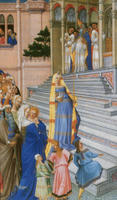 The net effect of listening to all this music, the Webern Symphony included, is to push me to pull out a recording I have owned for a long time but not played recently. This is a thoroughly desirable consequence, I might add.
The net effect of listening to all this music, the Webern Symphony included, is to push me to pull out a recording I have owned for a long time but not played recently. This is a thoroughly desirable consequence, I might add.
So I play the Messe de Notre Dame by Guillaume de Machaut[1]. This is a very old piece, predating the American Colonies by centuries, believed to have been composed in 1364. It is also the earliest 4-part polyphonic Mass by a known composer,[2] which puts it in at the dawn of polyphony. Music from this period seems relevant, at least in sound, to the polyphonic performances that I have been listening to over the past day, and listening to this performance reinforces that view. There is one aspect to this particular performance that is very important – particularly with reference to the psalms and hymns that I have heard. The director of this performance, Marcel Pérès, is very much aware of the contemporary performance practice that endeavors to recreate as authentic a reproduction of the music as heard in its own time as it is possible to achieve (not easy in relation to 14th century music). Thus he introduces variations in pitch, tempi, timbre, and volume plus ornamentations, glosses, alterations and micro-intervals that he believes more closely represent the performances of the period.
The net effect is to produce a performance that is not that different from the Gaelic rendition of Psalm 56 (described below), except that there is a technical facility and fluency in the performance of the Messe that is missing from the Psalm. Both are effective and both are moving. Listening to this extraordinarily densely textured music suggests that Partch[3], who regards Pope Gregory’s plainchant codification of the Mass as the first strike in the war of the Abstract vs. the Corporeal, a strike that led to a music inappropriate to the language and emotions of ordinary people, might have missed the boat here. For plainchant led directly to the early polyphony heard here which to my ears sounds as emotive and dramatic as any folk music, and even if the language is Greek and Latin, its meaning is quite clear. This is ritual music of the highest order.
Partch bypasses this aspect of medieval music entirely, preferring to concentrate on the secular folk art of troubadour and only reengaging with the ‘serious’ tradition around the time of Monteverdi[4]. I think if he had been aware (as very few were in the mid-20th century) of a church music performance in the style of this Messe, he might have revised his opinion. And let’s not forget that those highly expressive devices that Pérès applies here are equally applicable to plainchant. Plainchant may not have been nearly so plain and much closer the folk tradition.
[1] de Machaut, Guillaume Messe de Notre Dame performed by the Ensemble Organum, director Marcel Pérès, harmonia mundi HMC 901590
[2] Pérès, Marcel, notes to Messe de Notre Dame p.5
[3] Partch, Harry Genesis Of A Music 2nd Ed. Da Capo 1974 pp. 18-19
[4] Partch, Harry Genesis Of A Music 2nd Ed. Da Capo 1974 pp. 20-24
No comments:
Post a Comment